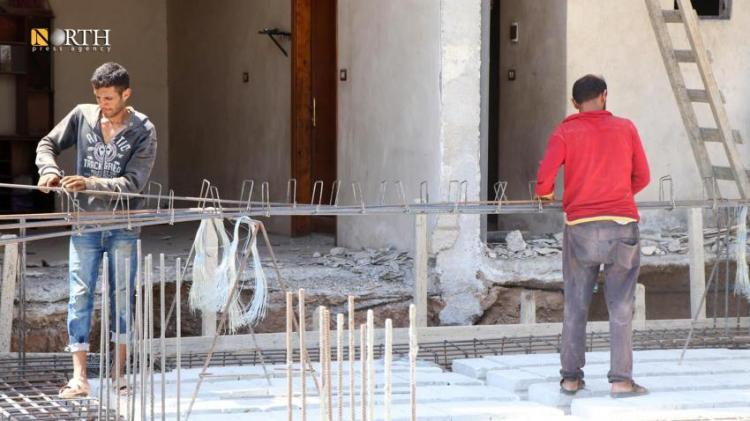HASAKAH, Syria (North Press) – In Hasakah city in Syria's northeast, Yaser Shekaki and a number of his employees work building in highest heat of summer without implementing the precautionary measures against coronavirus, which threatens the life of local residents. He justified his violation of the lockdown, saying that his need to work to secure the needs of his family pushed him not to comply.
The Autonomous Administration Health Authority recorded 16 new infections with coronavirus in its areas on Saturday, 11 of which are in Hasakah, including a death.
"We started working in this building before the lockdown; we are not against the people's safety, we all want to stay safe at home with our families, but bad life conditions force us to work," Skekaki said.
He pointed to the exhausted-looking employees and said "They need work, because they rely on the daily income to sustain their families."
Shekaki's workshop consists of five employees who work ten hours for six thousand Syrian pounds (about three dollars) per day.
The head of the workshop sees that some people are not implementing the precautionary measures and complying with the lockdown due to the current stifling living crisis that the country is witnessing. "A bread bag is 500 Syrian pounds and ice is 2000 Syrian pounds, so how could we live with the high prices and adhere to the precautionary measures?"
Although the Health Authority urged people to implement safety measures to prevent the spread of more coronavirus infections during the beginning of the imposed lockdown in Jazira region on Thursday, residents moved normally in the streets without implementing physical distancing or wearing masks.
In a statement to North Press, the head of the Health Authority Jiwan Mustafa said that he expects a spike in infections at the end of August in the region, confirming that the lockdown aims to delay the outbreaks.
Near Shekaki's work in Tel Hajar, people move in the streets normally, while shops are crowded with people not paying any attention to the precautionary measures. Many people continue the traditional greeting of kissing each other on the cheek.
It is the same for Lorans Issa, a builder from Hasakah. He travels four kilometers on foot to work in order not to pass by an Internal Security Forces (Asayish) checkpoint.
"We know that it is risky to work in these times but we are forced to work to secure our daily bread; our lives rely on our daily incomes," he said while moving among his diligent workers.
"We will implement all issued decisions whenever we are able to secure our daily needs. Honestly, we rely on work to secure our daily needs," Issa added.
The Health Authority of North and East Syria announced that the number of coronavirus infections reached 82, including four deaths and one recovered case.
(Reporting by Delsoz Yousef)

